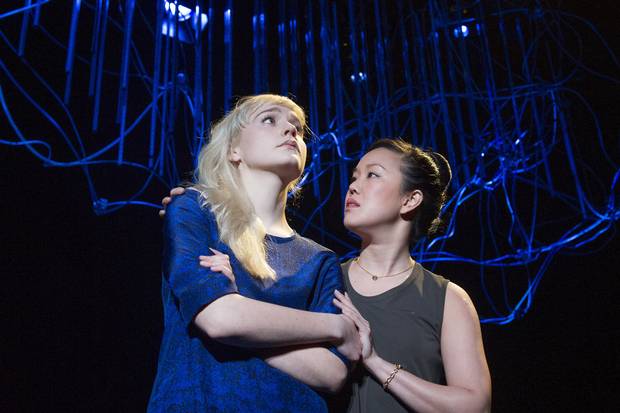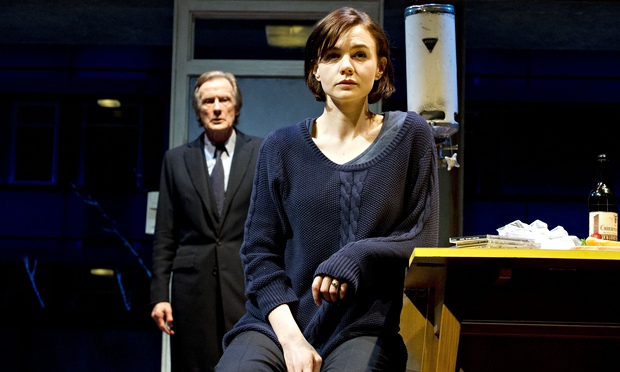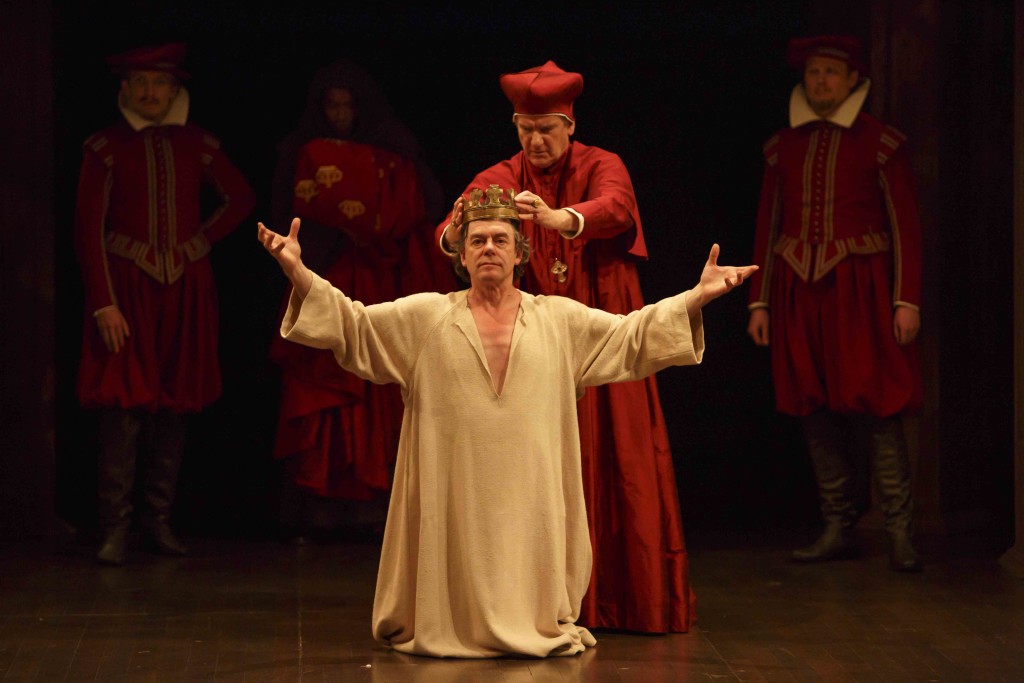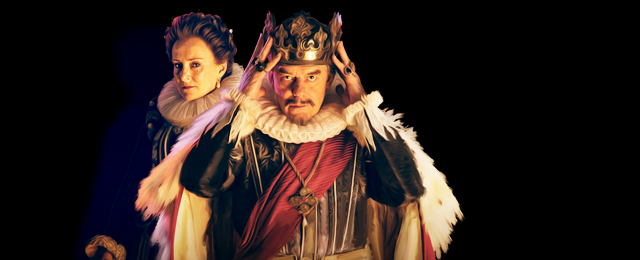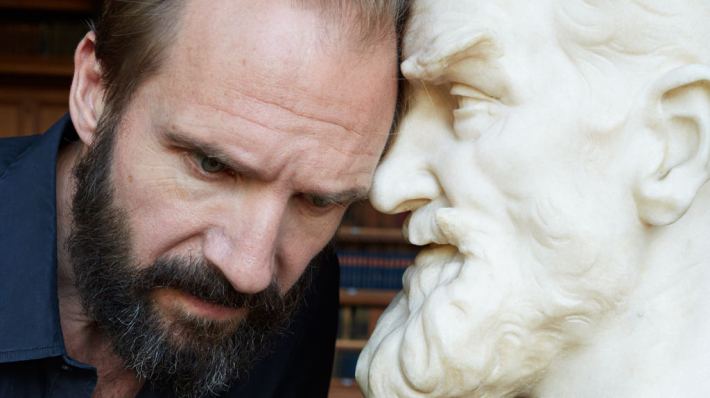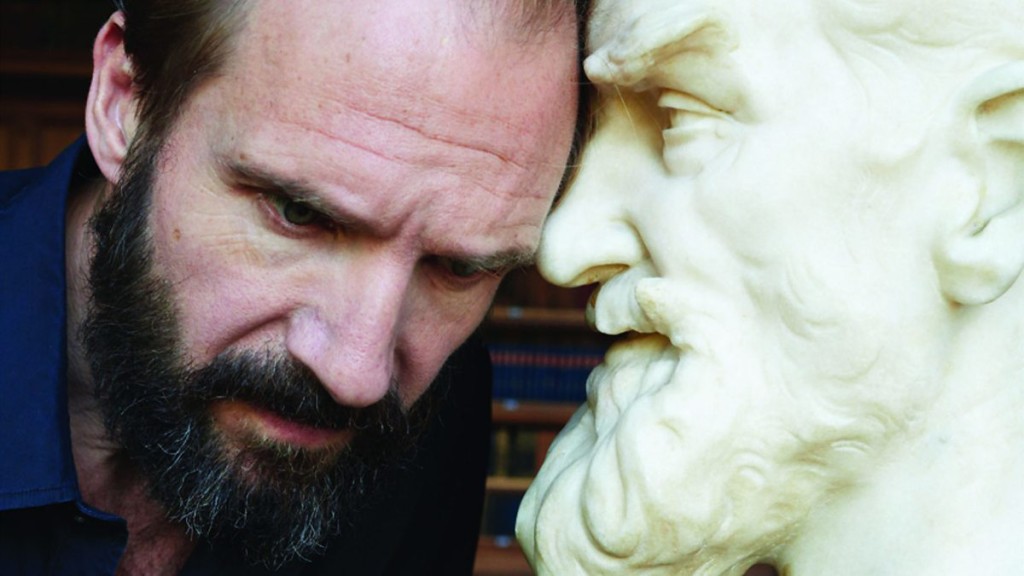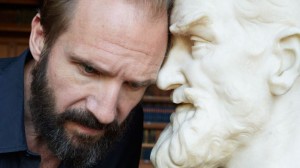One is an expansive Shakespearean study of power and its fruits, another looks at an awkwardly intimate reunion of two ex-lovers sundered by moral choices. One is a heady duel between biology and spirit at the frontiers of science, and one is a philosophical comedy that was at the frontier of drama a century ago.
They are four very different plays, but they have at least three things in common: All involve head-to-head clashes of diametrical worldviews – political, metaphysical, moral, religious; all turn on tricky and painful negotiations of those viewpoints; and they are all on next month’s schedule of HD stage-to-screen live captures from world stages, at the Amherst Cinema and other area venues – three of them encore performances of popular productions.
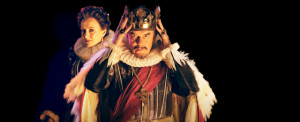
First up, showing at Amherst on Saturday, May 2nd, is Shakespeare’s King John. It’s the second installment in the Stratford (Ontario) Festival’s multi-year plan to stage – and broadcast – the entire Shakespearean canon. It’s an early, untidy and rarely performed work, but well worth a look, and Tim Carroll’s production gives it an exciting, headlong muscularity.
As one who has lately settled gratefully into British Shakespeare onscreen, courtesy of National Theatre Live, it took me a couple of scenes to readjust my ears to the North American accents, and to many of the actors’ overemphasis on the literal cadences of the verse. Like Henry V, this chronicle condenses “the accomplishment of many years into an hourglass” of less than a year. This makes for a plot crowded with, well, plotting, framed by a pair of battles and the political maneuvering that surrounds them.
When the play, set in the early 13th century, was written in the mid-1590s, Queen Elizabeth I was in her sixties, unmarried and childless. So the question of royal succession posed in this play was of more than passing interest in a nation where possession of the throne had so frequently been roiled by disputes, intrigues and open warfare.
Shakespeare’s John is hardly a heroic monarch: headstrong and manipulative but politically inept, he spends much of the play clinging vainly to a contested throne while clashing with French armies, maneuvering to appease his fractious nobility (though there’s no mention of the only thing we now remember him for, the Magna Carta) and scrambling to make up with the Church after he’s excommunicated for insubordination to the Pope.
Tom McCamus’ John is not just vain and hypocritical, at times he’s almost clownishly erratic, now dithering nervously, now withering with a kingly glance that veils a loony eye. The king is also beset by three strong women with their own agendas: his mother, Eleanor of Aquitane, widow of Henry II (remember The Lion in Winter? – that’s them); his sister-in-law Lady Constance, who claims the crown for her own son, 12-year-old Arthur; and Lady Faulconbridge, who’s embroiled in a parallel succession squabble between her two sons, one of them illegitimate. Patricia Collins’ Eleanor and Brigit Wilson’s Lady Faulconbridge are both icily effective, filling their regal roles with finesse, while Seana McKenna takes the opportunity of Constance’s big scene (she’s been driven half-mad with grief) to chew the scenery into tatters.
Some of the Shakespearean language is merely workmanlike, but much of it soars. (This play is the source of our expression “gilding the lily,” though we’ve been getting it wrong; the line actually reads “To gild refined gold, to paint the lily … is wasteful and ridiculous excess.”) And while the overall structure may wobble, some of the scenes are dramatic marvels. The moment when young Arthur’s jailer prepares reluctantly to burn out the boy’s eyes is the production’s emotional high point, with riveting performances by Wayne Best as the unwilling butcher and young Noah Jalava as Arthur.
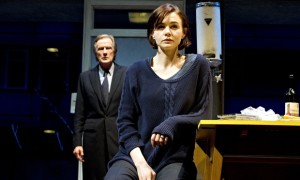
In Skylight, two conflicting value systems, encased in a pair of broken hearts, reach tentatively for common ground. David Hare’s 1995 play was revived last year in London and has now moved to Broadway at the same time as NT Live is offering screenings of a West End performance captured last October. (The May 9th showing at Amherst Cinema is already sold out and two more dates have been added: May 14th and June 6th.)
Hare is an unapologetically political, even polemical playwright. His recent work includes the National’s current stage adaptation of Beyond the Beautiful Forevers, Katherine Boo’s exposé of life in a Mumbai slum; the Worricker series of political thrillers which give a fictional gloss to the British government’s connivance in Bush-era war crimes; and Via Dolorosa, a scathing indictment of Israel’s depredations in the Palestinian territories.
In Skylight, his theme is entrepreneurial greed, which had been held up as the highest civic good in the Thatcher era and has more than flourished since then. Though a third character pops in at the beginning and the end, for exposition and rounding out, this is essentially a two-hander. Tom is a self-made, middle-aged millionaire whose small empire of hotels and restaurants supports a lavish lifestyle and a sense of entitlement. Kyra is a principled young teacher of “kids at the bottom of the heap” who lives in the crummy high-rise, low-rent London flat where the play unfolds over one night and morning.
The fact that these two are not only representations of radically divergent life choices and goals, but also former lovers still mourning the loss, lends both context and heart to the arguments that in the second half fly around the room and across the cultural-economic gulf that divides them. What saves the play from being simply a political debate wrapped in a lost-love romance is that it’s also, regularly, laugh-aloud funny, thanks especially to Bill Nighy’s pitch-perfect sense of comic timing and genius for wonky physicality.
Nighy, Hare’s most frequent collaborator, played the role of Tom in the nineties and now, some two decades on, he’s more than a tad too old to be taken seriously as 27-year-old Kyra’s paramour. But it’s not hard to overlook the creep factor in his effervescent performance, which makes the man’s preening self-regard, his acquisitive drive (for human as well as material possessions) and his neat-freak mania for control endlessly engaging and almost endearing.
While Tom is the play’s flamboyant centrifuge – the kind of personality that sucks up all the emotional air in a room – Kyra is its center of gravity. And Carey Mulligan’s performance is a miracle of conflicted feelings and visceral responses. Just watching her face is a lesson in acting where you don’t notice the acting. Since the playwright’s sympathies clearly side with Kyra’s commitment to a helping instead of taking profession, she gives as good as she gets when the reunion turns confrontational – and then some. While there are hints of doubt in Kyra’s defense of her choices, in the balance of perspectives Tom is a little too wrong and she’s a little too right for the dramatic conflict to be wholly satisfying.
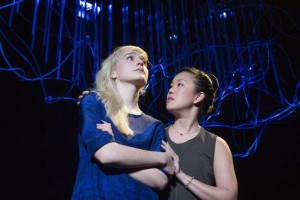
Warring points of view also define the fulcrum on which Tom Stoppard’s latest play teeters. Over the years (and this is his first new theater piece since 2006) he has almost single-handedly made philosophical musings once again a valid, and highly entertaining, subject for the stage. In contrast to George Bernard Shaw, whose characters are often stand-ins for their creator’s opinions, Stoppard has embedded this themes, from the nature of drama to the nature of subatomic particles, into the fabric of his characters’ situations and personalities, making the plays themselves metaphors of the ideas, and vice versa.
In The Hard Problem (at Amherst on May 9th), which opened last month at the National to decidedly mixed reviews, Stoppard veers toward the Shavian. While his dialogue is as witty and pointed as ever, almost all the characters are viewpoints first and people second.
These viewpoints, the title tells us, circle around what philosophers call “the hard problem” of consciousness, the “ghost” in the physical “machine” – that is, the phenomenon of “mind.” Is it separable from the physical brain, or just another product of neural chemistry? But while that’s what the people working at the play’s Krohl Institute for Brain Science are professionally concerned with, Stoppard actually seems more interested in exploring the same thing David Hare does in Skylight: the moral implications of self-interest versus altruism.
At the center is Hillary, a young psychologist who believes in God and miracles and on-your-knees prayer. She’s surrounded by secular materialism, personified by her sometime lover, Spike, for whom “there’s no baby, only bathwater”; the stock market gamer Amal, with a talent for “turning maths into money”; and the Institute’s founder and funder, Jerry Krohl, whose interest is artificial intelligence.
There’s also Bo, Hillary’s brilliant Chinese research assistant, too eager by half to please her boss; a lesbian couple (whose relationship to the play and its themes I didn’t grasp); Hillary’s fatherly department head; and Krohl’s adopted daughter, whose very existence forms the emotional core of the play but comes off as a too-obvious plot device.
Nicholas Hytner’s production – his last as the National’s artistic director after an invigorating 12-year tenure – moves crisply through its chock-full 100 minutes. Bob Crowley’s appropriately antiseptic set is overhung with a cluster of flashing strips of light interlaced by glowing ganglia – an electronic brain – and scene changes are accompanied by the faster-than-thought mathematics of Bach’s keyboard music.
Most of the performers manage to imbue their formulaic characters with human sparks. I enjoyed Damien Molony’s Spike, his take-no-prisoners intellectualism equal parts combative and dismissive; Vera Chok’s Bo, filtering her genius through feminine (and Asian) self-deprecation; Parth Thakerar’s arrogantly self-sure Amal; and Anthony Calf’s Krohl, the hedge-fund billionaire who’s a blistering tyrant in the office and a doting dad at home (though I endorse one critic’s comment that his American accent “yearns to cross the Atlantic but never quite leaves Cornwall”).
Where I parted from all the critics, pro and con, was Olivia Vinall’s Hillary. Even those who disparaged the play admired her performance as the scientist with faith in faith and a secret heartache. But I didn’t.
Vinall has previously played Desdemona and Cordelia at the National, and she’s been praised for giving guts to those two ladies so often downgraded to innocent-victim status. She’s plenty gutsy here, too, in her porcelain-beauty kind of way. But in contrast to Carey Mulligan’s organic complexity in Skylight, all I saw in Vinall’s intense portrayal of Hillary was technique, every moment seemingly chosen from a studied repertoire of expressions, gestures and voice work. It’s ironic, really, that the character who’s most invested in the possibility that consciousness is more than a fine-tuned network of neurons is given the play’s most calculated performance.
Finally … I saw the National’s current production of Shaw’s Man and Superman in London last month, and its first NT Live performance is coming up on May 14th in Amherst and at the Mahaiwe in Great Barrington, with an Amherst encore on June 6th. For my take on that proto-Stoppardian classic, see my previous post, On the National Tour.
If you’d like to be notified of future posts, email StageStruck@crocker.com

